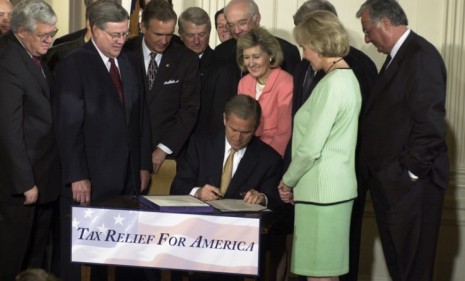The Bush tax cuts turn 10: Were they a 'colossal failure'?
The unemployment rate is stubbornly high, the national debt is ballooning, and many Americans are despondent over their finances. Are the Bush tax cuts to blame?

A free daily email with the biggest news stories of the day – and the best features from TheWeek.com
You are now subscribed
Your newsletter sign-up was successful
This week marks the 10th anniversary of the first of President George W. Bush's two major tax cuts. Ten years ago, the federal government had a budget surplus, which Bush said belonged to the American people, and should be returned to them through lower taxes. That budget surplus has since vanished, as have more than 1 million jobs over the last decade. Were Bush's tax policies an economic blunder?
Don't blame the Bush tax cuts: It's too simplistic to look at the Bush tax cuts and argue that tax cuts in general don't work, says Chris Edwards, the director of tax policy studies at the libertarian-leaning Cato Institute, as quoted by MSNBC. "So much goes on in the economy" — and so much has happened over the last decade — that it's hard to draw a general lesson from the Bush policies. Plus, the second round of cuts enacted by Bush in 2003, which affected taxes on dividends and capital gains, were a lot more effective than the income tax changes from 2001.
"Judging the Bush tax cuts-10 years later"
The Week
Escape your echo chamber. Get the facts behind the news, plus analysis from multiple perspectives.

Sign up for The Week's Free Newsletters
From our morning news briefing to a weekly Good News Newsletter, get the best of The Week delivered directly to your inbox.
From our morning news briefing to a weekly Good News Newsletter, get the best of The Week delivered directly to your inbox.
This "colossal failure" only helped the rich: Bush promised the tax cuts would put money back in people's pockets, says Annie Lowrey at Slate. But the benefits of the cuts "mostly accrued to the rich," with the wealthiest 1 percent of Americans reaping 38 percent of the gains. The promised job and economic growth turned out to be the slowest since World War II. And while the wealthy saw their earnings go up, the gap between rich and poor only got wider. On top of all that, "the cuts cost about $2.6 trillion between 2001 and 2010, according to the Economic Policy Institute — adding to a debt future generations of taxpayers will pay for, plus interest."
"Happy 10th birthday, Bush tax cuts!"
And we haven't learned from that failure: Of all the policies passed over the last decade, "Bush's two rounds of tax cuts bear more responsibility" for our current deficits than anything else, says Ezra Klein at The Washington Post. And yet Republicans like Tim Pawlenty still insist that cutting taxes will boost economic growth — and somehow also lead to increased federal revenues. "In other words, you can have your cake, eat it too, and fit into those pants you haven't worn since high school." At least Bush admitted his cuts would cost the government money. Republicans today are using new new math and "making wilder, more outlandish claims for tax cuts than Bush ever dared."
"What the GOP didn't learn from the Bush tax cuts"
A free daily email with the biggest news stories of the day – and the best features from TheWeek.com